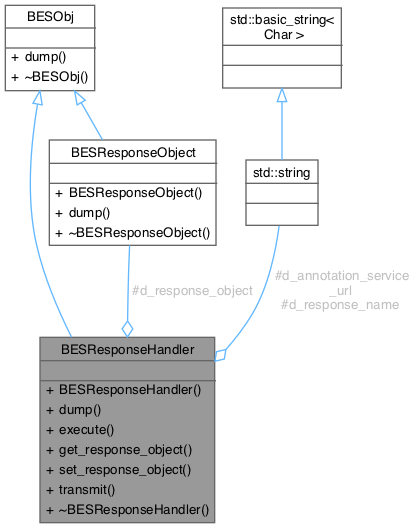handler object that knows how to create a specific response object More...
#include <BESResponseHandler.h>


Public Member Functions | |
| BESResponseHandler (std::string name) | |
| void | dump (std::ostream &strm) const override |
| dumps information about this object | |
| virtual void | execute (BESDataHandlerInterface &dhi)=0 |
| knows how to build a requested response object | |
| virtual BESResponseObject * | get_response_object () |
| return the current response object | |
| virtual BESResponseObject * | set_response_object (BESResponseObject *o) |
| replaces the current response object with the specified one, returning the current response object | |
| virtual void | transmit (BESTransmitter *transmitter, BESDataHandlerInterface &dhi)=0 |
| transmit the response object built by the execute command using the specified transmitter object | |
Protected Attributes | |
| std::string | d_annotation_service_url |
| std::string | d_response_name |
| BESResponseObject * | d_response_object = nullptr |
Friends | |
| class | resplistT |
Detailed Description
handler object that knows how to create a specific response object
A response handler is something that knows how to create a response object, such as a DAS, DDS, DDX, informational response object. It knows how to construct the requested response object but does not necessarily fill in the response object. It does know, however, how to have other objects fill in the response object. For example, a BESDASResponseHandler knows that it needs to go to each of the request handlers (data handlers) for each of the containers requested so that those request handlers can fill in the response object. Another example is the BESHelpResponseHandler, which knows to construct an informational response object and then pass that informational response object to each registered request handler (data handler) so that each of the request handlers has an opportunity to add any help information it needs to add.
Response handlers such as the BESStatusResponseHandler (and others) are able to create the informational response object and fill it in without handing off the response object to any other object. But usually, the response handler passes the response object to another object to have it fill in the response object.
A response handler object also knows how to transmit the response object using a BESTransmitter object.
This is an abstract base class for response handlers. Derived classes implement the methods execute and transmit.
Definition at line 77 of file BESResponseHandler.h.
Constructor & Destructor Documentation
◆ BESResponseHandler()
|
explicit |
Definition at line 50 of file BESResponseHandler.cc.
◆ ~BESResponseHandler()
|
override |
Definition at line 55 of file BESResponseHandler.cc.
Member Function Documentation
◆ dump()
|
overridevirtual |
dumps information about this object
Displays the pointer value of this instance along with the name of this response handler and, if present, dumps the response object itself.
- Parameters
-
strm C++ i/o stream to dump the information to
Implements BESObj.
Reimplemented in bes::NullResponseHandler, bes::SetContextsResponseHandler, bes::ShowNodeResponseHandler, BESServicesResponseHandler, BESSetContainerResponseHandler, BESSetContextResponseHandler, BESShowContainersResponseHandler, BESShowContextResponseHandler, BESShowDefsResponseHandler, BESShowErrorResponseHandler, BESStatusResponseHandler, BESStreamResponseHandler, BESVersionResponseHandler, GatewayPathInfoResponseHandler, SampleSayResponseHandler, ShowBesKeyResponseHandler, ShowPathInfoResponseHandler, SiteMapResponseHandler, and W10nShowPathInfoResponseHandler.
Definition at line 82 of file BESResponseHandler.cc.
◆ execute()
|
pure virtual |
knows how to build a requested response object
Derived instances of this abstract base class know how to create a specific response object and what objects (including itself) to pass that response object to for it to be filled in.
- Parameters
-
dhi structure that holds request and response information
- Exceptions
-
BESHandlerException if there is a problem building the response object BESResponseException upon fatal error building the response object
Implemented in bes::NullResponseHandler, bes::SetContextsResponseHandler, bes::ShowNodeResponseHandler, BESCatalogResponseHandler, BESConfigResponseHandler, BESDap4ResponseHandler, BESDASResponseHandler, BESDataDDXResponseHandler, BESDataResponseHandler, BESDDSResponseHandler, BESDDXResponseHandler, BESDefineResponseHandler, BESDelContainerResponseHandler, BESDelContainersResponseHandler, BESDelDefResponseHandler, BESDelDefsResponseHandler, BESDMRResponseHandler, BESHelpResponseHandler, BESProcIdResponseHandler, BESServicesResponseHandler, BESSetContainerResponseHandler, BESSetContextResponseHandler, BESShowContainersResponseHandler, BESShowContextResponseHandler, BESShowDefsResponseHandler, BESShowErrorResponseHandler, BESStatusResponseHandler, BESStreamResponseHandler, BESUsageResponseHandler, BESVersionResponseHandler, BESWWWResponseHandler, BESXDResponseHandler, GatewayPathInfoResponseHandler, ncml_module::NCMLCacheAggResponseHandler, SampleSayResponseHandler, ShowBesKeyResponseHandler, ShowPathInfoResponseHandler, SiteMapResponseHandler, and W10nShowPathInfoResponseHandler.
◆ get_response_object()
|
virtual |
return the current response object
Returns the current response object, null if one has not yet been created. The response handler maintains ownership of the response object.
- Returns
- current response object
- See also
- BESResponseObject
Definition at line 62 of file BESResponseHandler.cc.
◆ set_response_object()
|
virtual |
replaces the current response object with the specified one, returning the current response object
This method is used to replace the response object with a new one, for example if during aggregation a new response object is built from the current response object.
The caller of set_response_object now owns the returned response object. The new response object is now owned by the response object.
- Parameters
-
o new response object used to replace the current one
- Returns
- the response object being replaced
- See also
- BESResponseObject
Definition at line 68 of file BESResponseHandler.cc.
◆ transmit()
|
pure virtual |
transmit the response object built by the execute command using the specified transmitter object
- Parameters
-
transmitter object that knows how to transmit specific basic types dhi structure that holds the request and response information
- Exceptions
-
BESTransmitException if problem transmitting the response obj
- See also
- BESResponseObject
- BESTransmitter
- BESDataHandlerInterface
- BESTransmitException
Implemented in bes::NullResponseHandler, bes::SetContextsResponseHandler, bes::ShowNodeResponseHandler, BESCatalogResponseHandler, BESConfigResponseHandler, BESDap4ResponseHandler, BESDASResponseHandler, BESDataDDXResponseHandler, BESDataResponseHandler, BESDDSResponseHandler, BESDDXResponseHandler, BESDefineResponseHandler, BESDelContainerResponseHandler, BESDelContainersResponseHandler, BESDelDefResponseHandler, BESDelDefsResponseHandler, BESDMRResponseHandler, BESHelpResponseHandler, BESProcIdResponseHandler, BESServicesResponseHandler, BESSetContainerResponseHandler, BESSetContextResponseHandler, BESShowContainersResponseHandler, BESShowContextResponseHandler, BESShowDefsResponseHandler, BESShowErrorResponseHandler, BESStatusResponseHandler, BESStreamResponseHandler, BESUsageResponseHandler, BESVersionResponseHandler, BESWWWResponseHandler, BESXDResponseHandler, GatewayPathInfoResponseHandler, ncml_module::NCMLCacheAggResponseHandler, SampleSayResponseHandler, ShowBesKeyResponseHandler, ShowPathInfoResponseHandler, SiteMapResponseHandler, and W10nShowPathInfoResponseHandler.
Friends And Related Symbol Documentation
◆ resplistT
|
friend |
Definition at line 84 of file BESResponseHandler.h.
Member Data Documentation
◆ d_annotation_service_url
|
protected |
Definition at line 82 of file BESResponseHandler.h.
◆ d_response_name
|
protected |
Definition at line 79 of file BESResponseHandler.h.
◆ d_response_object
|
protected |
Definition at line 80 of file BESResponseHandler.h.
The documentation for this class was generated from the following files: